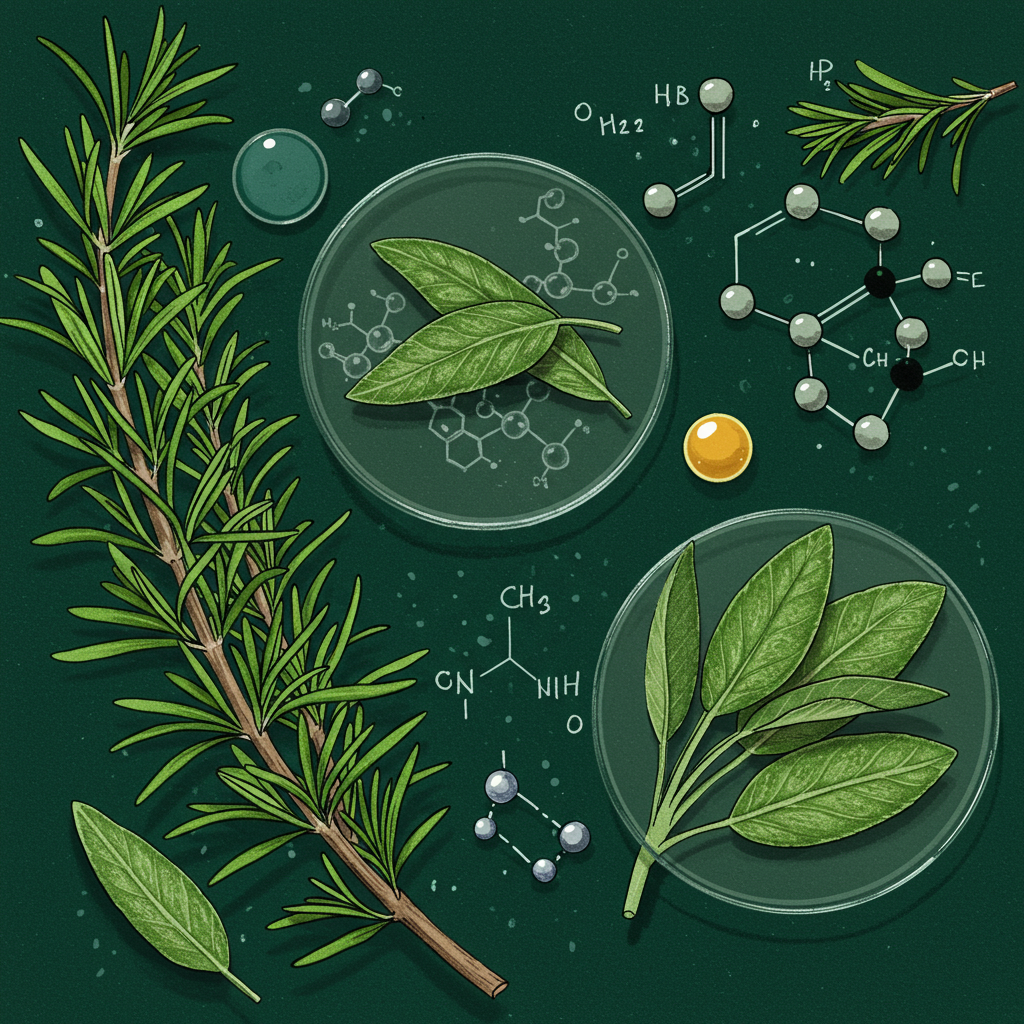Could common herbs found in your kitchen spice rack hold a secret weapon against alzheimer’s disease? Recent scientific investigation suggests this intriguing possibility, identifying a powerful compound within rosemary and sage that shows remarkable promise in laboratory settings. While these findings are highly encouraging, experts are quick to caution that this research is still in its early stages, and it’s far too soon to change your cooking habits hoping for a cure.
Scientists at the Scripps Research Institute have pinpointed a natural chemical called carnosic acid. This compound is abundant in popular culinary herbs like rosemary and sage. Their groundbreaking study, published in the journal Antioxidants, explored carnosic acid’s potential therapeutic effects on neurodegenerative disorders, including Alzheimer’s disease. The results, observed in mice, have sparked cautious optimism within the research community.
Exploring Carnosic Acid’s Potential Against Alzheimer’s
The Scripps research team, led by postdoctoral associate Piu Banerjee and neurologist Dr. Stuart Lipton, focused on the inherent properties of carnosic acid. They recognized its significant antioxidant and anti-inflammatory capabilities. These properties are crucial because oxidative stress and inflammation are key factors implicated in the progression of Alzheimer’s and other brain diseases.
In their study, the researchers developed a drug based on carnosic acid. They administered this drug to mice genetically engineered to exhibit advanced Alzheimer’s-like symptoms. The results were noteworthy. Treated mice demonstrated a significant improvement in key indicators of brain health.
How Carnosic Acid Showed Promise in Mouse Models
The study observed several positive outcomes in the mice treated with the carnosic acid-based drug:
Increased Neurons and Synapses: Researchers saw a significant increase in the number of neurons (brain cells) and synapses (the critical connections between brain cells). Maintaining these connections is vital for cognitive function like memory and learning.
Reduced Inflammation: The treatment effectively reduced brain inflammation, particularly the type triggered by some existing anti-amyloid antibody therapies currently used or being tested for Alzheimer’s. Reducing neuroinflammation is a major goal in treating neurodegenerative diseases.
Improved Behavior: The treated mice also showed improvements in learning and memory tasks, aligning with the observed cellular benefits.
A unique aspect highlighted by the researchers is carnosic acid’s function as a “prodrug.” This means the compound is relatively inactive until it encounters oxidative and inflammatory stress within the body. This selective activation suggests it could potentially target only damaged or stressed brain cells, leaving healthy cells unaffected. This mechanism is a key reason why researchers believe it could be a safe therapeutic option. Dr. Lipton suggested that carnosic acid might help mitigate the generalized inflammation often seen in the aging brain. The study received partial funding from the National Institutes of Health, underscoring its significance.
Why You Can’t Just Eat More Rosemary and Sage Yet
Despite the exciting results in animal models, experts strongly emphasize the need for caution and further research. Courtney Kloske, director of scientific engagement for the Alzheimer’s Association, stressed that while mouse studies are invaluable for understanding disease mechanisms, they are just one step. Rigorous human studies involving diverse populations are essential to validate these findings and determine if the benefits translate to people.
The Scripps researchers themselves clarified a critical point: simply adding more rosemary or sage to your meals will not provide the therapeutic levels of carnosic acid used in their study. It would be impractical and potentially unsafe to consume the vast quantities required to reach those concentrations through diet alone.
Both Kloske and neurologist Dr. Lee Murray cautioned against using rosemary, sage, or carnosic acid supplements as a standard treatment or preventative measure for Alzheimer’s at this time. Dr. Murray acknowledged the encouraging nature of the pre-clinical data and its potential to open new therapeutic avenues. However, he reiterated that insufficient clinical evidence currently exists to recommend these herbs or compounds for treating Alzheimer’s. Researchers are cautiously optimistic about the possibility of future human clinical trials, but the outcome in humans remains unknown.
Broader Strategies for Supporting Brain Health Now
While research into compounds like carnosic acid progresses, what can individuals do today to support their cognitive health and potentially reduce the risk of cognitive decline? Scientific evidence points strongly towards lifestyle factors, particularly diet, exercise, and sleep, as having a significant impact on brain function over time.
Research has linked specific lifestyle choices to cognitive health. A study published in Nutrients examined the relationship between dietary antioxidants, alcohol consumption, and the risk of mild cognitive impairment (MCI) in older adults. MCI involves subtle changes in memory and thinking that can sometimes precede dementia. The study found a strong association: higher intake of specific dietary antioxidants (Vitamins A, C, E, Magnesium, Zinc, Selenium) was linked to significantly lower odds of having MCI.
Diet and Lifestyle Choices for Cognitive Wellbeing
The Nutrients study revealed a crucial interaction: the protective effect of high antioxidant intake was statistically significant only among individuals who did not consume alcohol. Participants who drank alcohol even just one to two times per week had more than double the odds of MCI compared to abstainers. This challenges the idea that moderate alcohol consumption offers brain benefits.
Other research emphasizes specific dietary patterns and habits. For example, dietitians highlight evening habits that can influence brain health. Avoiding certain things after 5 p.m. might help strengthen the brain’s defenses:
Limit Sugar-Sweetened Drinks: High sugar intake is linked to inflammation, insulin resistance, and oxidative stress, all harmful to the brain. Choose alternatives like kefir or plain water.
Moderate Alcohol Intake: Alcohol disrupts sleep quality, which is vital for the brain’s waste clearance processes (like clearing amyloid proteins). Opt for herbal teas instead.
Avoid Late-Night Caffeine: Large caffeine doses close to bedtime interfere with sleep quantity and quality. Aim to finish caffeine consumption many hours before sleep.
Reduce Excess Sodium: High sodium can impair blood flow to the brain and damage blood vessels. Focus on whole foods and flavor with herbs and spices instead of salt.
Be Mindful of Dark Chocolate: While healthy in moderation earlier in the day, the caffeine and theobromine in dark chocolate can disrupt sleep if consumed too late.
Finish Heavy Meals Earlier: Eating large meals close to bedtime can disrupt sleep and digestion. Allow 2-3 hours between dinner and sleep.
Beyond avoiding certain things, actively incorporating brain-healthy foods is recommended. A plant-forward diet rich in antioxidants is key. The MIND diet, a blend of the Mediterranean and DASH diets, specifically targets brain health by emphasizing berries, leafy greens, nuts, whole grains, fish, and beans. Antioxidant-rich foods include colorful fruits, vegetables, nuts, and seeds. Getting these nutrients from food is superior to relying on sources like alcohol.
Other Avenues of Research and Management
Beyond diet and lifestyle, scientists are exploring various potential interventions. For instance, an observational study by researchers at the Karolinska Institutet, published in Alzheimer Research and Therapy, investigated common cholesterol-lowering drugs called statins. The study, using data from over 15,500 Alzheimer’s patients in Sweden, found that those taking statins experienced a “gentler decline” in cognitive ability over time compared to non-users.
While this study identifies an association, it cannot prove that statins directly cause* the slower decline. It’s an important step, challenging previous caution about statin use in dementia patients, but requires clinical trials to confirm causality and identify specific patient groups who might benefit most. It highlights that different research pathways, from natural compounds to existing medications, are being explored in the fight against Alzheimer’s.
Frequently Asked Questions
What is carnosic acid and how does it show promise for Alzheimer’s?
Carnosic acid is a natural compound found in herbs like rosemary and sage. Research at Scripps Research Institute found it has strong antioxidant and anti-inflammatory properties. In mouse studies, a drug based on carnosic acid improved brain health indicators like neuron count and reduced inflammation, leading to better memory and learning in mice with Alzheimer’s-like disease. It acts as a “prodrug,” activating only in stressed brain cells.
Can I get the benefits by eating more rosemary or sage or taking supplements?
Currently, no. The therapeutic dose of carnosic acid used in the promising mouse study is far higher than what you can get from simply eating rosemary or sage. Experts caution against changing your diet or taking carnosic acid supplements specifically for Alzheimer’s prevention or treatment based on this early research. It’s not proven effective or safe for this purpose in humans yet.
What are proven ways to support brain health now while research continues?
While compounds like carnosic acid are promising for the future, established ways to support brain health include adopting a healthy lifestyle. This involves a plant-forward, antioxidant-rich diet (like the MIND diet), avoiding excessive sugar, alcohol, and sodium, ensuring sufficient sleep (7-9 hours), incorporating regular physical exercise, and managing cardiovascular risk factors like blood pressure and cholesterol (potentially with statins if medically indicated, though not specifically for dementia).
In conclusion, the discovery of carnosic acid’s potential against Alzheimer’s in laboratory settings offers an exciting glimpse into future therapeutic possibilities rooted in nature. This research, alongside studies into diet, lifestyle, and existing medications like statins, underscores the multifaceted approach needed to understand and combat cognitive decline. While the journey from mouse study to human treatment is long and requires extensive clinical trials, these findings add another piece to the complex puzzle of Alzheimer’s. For now, the most powerful tools we have for brain health remain the proven strategies of a healthy diet, regular exercise, and good sleep.




